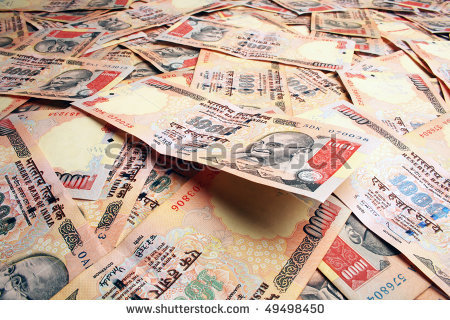Nowadays one is seeing a lot of money in India. Stashes and stashes of unaccounted wealth, in new and old currency notes, in pictures online and in newspapers. For most, including me, it's a new experience to see so much cash even in a picture.
The pictures look gross - and scary. What could so much money be needed for by an individual? More importantly, what askew imperative makes one attach more value to that sterile heap over honour and good name?
The imperative is greed, of course.
Greed is not a pretty word. It evokes unpleasant images, and is always deleterious. Yet, it holds a pompous grip over many. Greed is about amassing something coveted, beyond all proportion. This covetousness gives at best a psychological satisfaction, because, there is no way one can use all that is accumulated. The pile grows and grows to reach monstrous proportions and finally devours the consumer. (Remember Midas?) This feckless greed for material wealth and its trappings, sans inner growth, and a moral framework, is the malady of the times.
All kinds of greed are vulgar and ungainly and lead to trouble. Over-eating makes you throw-up. That is the immediate fallout of short-term greed. Long term, the results of chronic binging and overeating are more damning. The digestive system cannot handle the unnatural load and collapses. Disease and ill health follow, to plague the hapless individual for the rest of life.
Greed for money is no different. It is unnatural and leads to an imbalance in the psyche of the individual. All sense of proportion is lost by the relentless craving to acquire and hoard more. The wealth acquired is for its own sake, because beyond a point, wealth is redundant. It may be sufficient for ten lifetimes - yet, it goes on being desired. Why? Because money here is not a means to an end, but the end itself. Result? A mania for possession ... (cash, properties, luxury items etc.) Another matter that this manic pursuit robs you of the biggest treasure of all - peace of mind - which ultimately is the only thing worth having. Ask the Buddha, who, walked away from the wilderness of material luxury to the plenitude of spiritual enlightenment.
Lure of lucre is, no doubt, a primary attraction of life. Everybody wants money, because everybody needs money. However, the problem starts when you don't need money, yet continue to want it - at any moral cost.
The problem then, is not making money, but the greed for acquiring more and more, beyond need, beyond use. Blood in the body needs to circulate in a regulated fashion for good health. Money too, must circulate in a regulated manner, for the mental and spiritual well-being of an individual.
A question is why would someone with millions begrudge a percentage of it to the government or the less fortunate? It is baffling. The powerful 'maya' (Illusion) is at play here, which blurs vision, and confounds the intellect. However, a framework of strong values, and right thinking are sure safe- guards. If you are fortunate to have extra, then, resist hoarding your wealth. Instead, direct and channel the excess, to good works and help in the uplift of the needy and under-privileged sections of society. In the bargain, you will be helping not only others, but yourself too, by earning much-needed good karma.
It can be argued that the rich have laboured to collect their riches. True. (In most cases.) However, as scriptures say, to acquire excessive wealth by entirely honest means is well-nigh impossible, even for the most well-intentioned. Some tweaking of morals is necessitated and this takes on larger and larger proportions as the wealth grows.
The bigger question is - Why do 'respectable' people with a good standing in society, who have no perceived lack in areas of wealth, status, and 'reputation', buck their morals and fall prey to the greed for more? What is the loss and what is the gain? Is it worth it?
When major scams are uncovered and members of the top brass are found to be party to the dubious wheeling and dealings, one is nonplussed. What was the perceived lack in their lives, you wonder, that made them go full tilt, and barter away their good name for a little extra stash in a cold vault??
Sad. What an unholy and unproductive barter. Money lost can be recovered again, but a good name tarnished, can never be reclaimed.
Shame.

